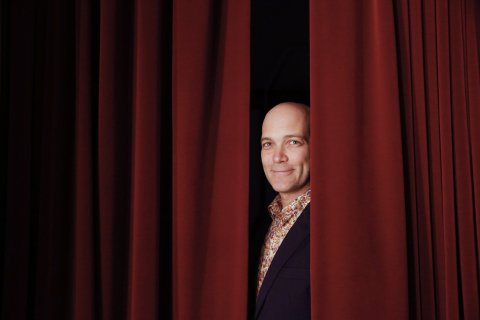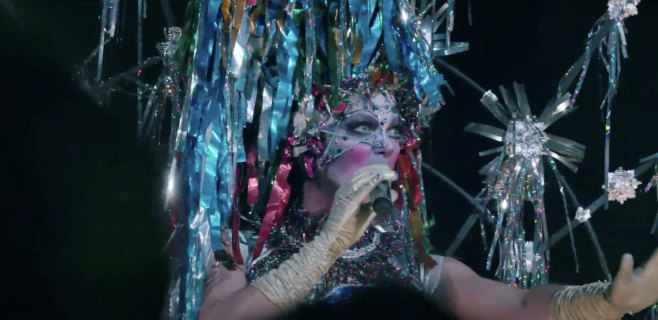
Taylor Mac
Taylor Mac, actor, drag queen, performer, singer-songwriter, playwright, and director, won The International Ibsen Award 2020.
Taylor Mac’s work has been described as an act of struggle against precisely categorisation: at the heart of his practice is always an exploration of heterogeneity, the divergent, and the ambiguous.
His productions draw on everything from cabaret to commedia dell’arte to Greek drama, drag, and contemporary musical theatre. The 46-year-old from Stockton, California has referred to himself as a «collagist».
The legacy of his time as a drag queen following his training at the American Academy of Dramatic Art in New York is not hard to spot in his productions; it was on this club scene, where he was not subject to the same rules and social contracts, that Mac felt free to expand his form, where he had the space to find his extravagant, maximalist stage language, which in no way strives for «purity» of expression, but rather for a transgression of expectations, forms, norms. Mac’s work is not interested in the art of limitation. Undoubtedly, among his characteristic features are the intricate, bizarre, and grand costumes by his regular collaborator Machine Dazzle, whose interplay between form and content insists on juxtaposing the grotesque with the beautiful. Or insists, perhaps, on the beautiful in the grotesque, and vice versa.
As an audience member you should not expect to remain a passive spectator; Mac often addresses the audience directly, making them active participants. This was very much the case during his monumental, 24-hour work, A 24-Decade History of Popular Music, which takes us through American history from 1776 to 2016 by using hits from each era. The piece, which landed him a Pulitzer nomination, has travelled the world, usually divided into four segments – last autumn during the Berliner Festspiele – and is an alternative history of sorts, placing the American eccentrics and outsiders, the excluded and the oppressed who have run the nation’s counterculture, centre stage.
This very act is a recurring theme in Mac’s work: his will to draw the periphery towards the centre. To tell the stories of those living on the margins of mainstream culture. But it never feels like the margins as seen from the centre – a story about those who are different. Rather, in Mac’s work, the margins become the centre. In his first Broadway show, Gary: A Sequel to Titus Andronicus (2019, seven Tony Award nominations), Taylor Mac picks up the failed street clown who is only barely allowed to appear before he is executed in Shakespeare’s deadliest tragedy. In his «sequel», Mac lets him escape death, in return for cleaning up after the great bloodbath. It was the feeling of living in a revenge tragedy that made Titus Andronicus appeal to Mac; in Gary, we follow the cleaners who can’t agree on how to clean up after disaster strikes, and in the process take in a play about the polarisation between American liberals.
Gary is the fourth piece in a cycle modelled on the Dionysia of ancient Greece – a festival typically featuring three tragedies and one comedy. Mac has inverted the model, making three comedies and one tragedy instead. The second piece in this quartet on polarisation was Hir (pronounced here), which has already been performed on several different stages. It follows a soldier returning to find his family transforming completely; the former patriarch of the house has been pacified by a stroke, and is currently being fed oestrogen, involuntarily subjected to the mother’s new, anti-authoritarian regime, drowning in disorder, while his former sister Maxine is becoming his brother Max through testosterone treatment. It is a piece of absurd kitchen sink realism borne directly out of our postmodern, politically inflamed era.
At first glance, one could easily assume that Mac positions himself at the forefront of the identity politics movement that has emerged in the US during recent years. Which he does, by addressing the issues and giving voice to marginalised and queer communities – merely the representation in itself appears significant in an otherwise homogenous culture. And yet identity politics remains a secondary theme, and we never receive an unequivocal political message: in the driver’s seat are the changes, the differences between us.
Whether he appears on stage in his own productions, as an accomplished singer or performance artist, or whether he simply writes pieces that can be produced as more formally traditional plays, Mac always seems to create open heterogeneous spaces, where the governing norms of society fall away, and the space expands. As he has said about A 24-Decade History of Popular Music: «We don’t have any rituals that allow us to express the full range of ourselves. I really think of the show as a ritual sacrifice, and what you’re sacrificing is your obstinate sense of self.»
Read more about Taylor Mac and the International Ibsen Award in Rolling Stone.
Video
-
Ibsen Award Ceremony
Watch the celebration of Taylor Mac, this year’s winner of the world’s greatest theatre award, in a formal event hosted by Anne Lindmo.
-
Introducing Taylor Mac
Meet Taylor Mac - winner of The International Ibsen Award 2020.


